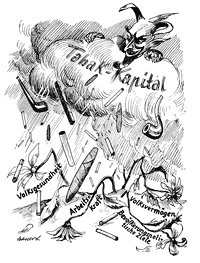 2007 will see a smoking ban introduced in public buildings in England. Most significantly, no provision is allowed for private clubs who may wish to allow smoking.
2007 will see a smoking ban introduced in public buildings in England. Most significantly, no provision is allowed for private clubs who may wish to allow smoking.As a cigar smoker myself, I am acutely aware of the degree of moral hysteria surrounding this issue, where there has been an intertwining of public health concerns (often based upon exagerated misinformation), and an acceptance of the basic principle that the government should legislate against behaviour regarded as anti-social.
On the public health issue, some otherwise sane people lose all sense of proportion over the dangers of second hand smoke. As social animals living in collective, industrial societies we are exposed to constant diverse health risks due to the activities of others – traffic fumes, industrial waste gases, pollen, food additives – second hand tobacco smoke is only one of many.
And the evidence of health dangers from second hand smoke are presumptive projections that are not empirically established. Everyone understands that buying a lottery ticket doesn’t mean you will win the lottery, and in the same way slight exposure to second hand smoke does not necessarily pose any significant health risk. Public policy considerations need to balance an actual assessment of risk, against the requirement that individuals must be able to make their own choices, not idealise a risk-free environment that can never exist.
What is more, the ban on private clubs allowing smoking was allegedly based upon the entirely specious hokum of health concerns for bar workers. But cigarette smoke is measured at around 1 micron, whereas a good extraction system will remove particulates down to about 1/3 micron. Good air circulation will also dilute and disperse any gaseous components, so that a smoking environment with air purification can be cleaner than a non smoking environment without extraction. I have worked in factories where much more toxic substances than cigarette smoke are handled, and appropriate extraction systems can and do provide a safe working environment.
Had the health issue been the genuine cause of concern then legislation could have enforced extraction systems, and other measures. But the real issue is that people support the ban because they think smoking is anti-social – “why should I breathe your smoke?” Now to a certain degree this is sensible, and a choice of non-smoking and smoking venues should be provided. But of course a choice has precisely not been allowed in the current legislation.
This is what ties the smoking issue into the wider politics of New Labour, with its preoccupations about anti-social behaviour. Or more specifically, using legislation to enforce arbitrary social preferences of the majority against minorities, in order to enforce shared community of values.
For example, Anti Social Behaviour Orders (ASBOs) are, to the best of my knowledge, an internationally unique form of legislation because they do not criminalise specific behaviours, but rather any arbitrary behaviour that anyone else find anti-social, provided a magistrate agrees: then if you breach the order the behaviour is criminal. The only international precedent for this form of legislation I have been able to find (and this is not just a cheap shot) is Himmler’s proposed legislation of 1944 against Gemeinschaftsfremde. (Community aliens). This was more liberal than New Labour's law, because it required a compulsory referral to social workers before imprisonment if the Nazi equivalent of an ASBO was breached, and only proposed prison if social work referral failed. Interestingly Himmler's law was not enacted as both the German judiciary and the police opposed it for being unworkable and in principle contrary to natural justice to imprison people for arbitrary anti-social behaviour.

It is no coincidence that the Nazis were also the first country to ban smoking. A myth is propagated by today’s anti-smoking campaigners that the Nazi ban was racially inspired due to Jewish influence in the tobacco industry, and therefore different to their own campaigns. This is entirely false, the concerns of the Nazis were exactly the same issues of public health, and even echoed leftist criticisms of smoking that tobacco comapanies were making profits at the expense of public health. The 1944 national ban on smoking on public transport was personally initiated by Hitler over the issue of passive smoking risks, and Nazi scientists Franz H Muller (in 1939) and Eberhard Schairer and Erich Schoniger (in 1943) were the first to publish good research demonstrating provable links between smoking and lung cancer.
The question is whether the state should restrict choice in order to enfoirce healthy living. The anti-smoking campaigners, (including the Nazis!) believe the state should play this interventionist role - and the spurious arguments about second hand smoke are a stalking horse for their full agenda, which is to ban smoking altogether.
Now clearly New Labour are not Nazis. But there is a tendency within New Labour that shares the Nazi ideology of communitarianism. This was expressed by the Nazis in terms of Volksgemeinschaft – a national community with shared values that were rather arbitrary (for example, against swing music and English style clothes). The logic of New Labour is “triangulation” around the issues that affect swing voters, to win electioons at any cost. As seen in the 2005 Hodge Hill by-election this can lead Labour to conduct a basically far-right election campaign, pandering to the prejudices of voters, in echo of Thatcher's defence of "people like us".
Nor was this an aberration, Liam Byrne the victorious labour candidate is an affirmed Blairite who is now immigration minister! You can view all his election material here. Labour decided to contest this marginal working class constituency on the issues of opposing immigration, and authoritarian measures against anti-social behaviour. More recently we have seen New Labour orchestrate a moral scare about Moslem women wearing a veil – largely demonising people because they are different from the arbitrary values of the majority.
I have argued elsewhere about the changes in the Labour Party: “the Labour Party has a broadly progressive electoral constituency, and historical links with the trade union infrastructure, but it is in continued antagonism with both of these elements. Nevertheless, although the Party no longer articulates the aspirations of these support groups, they do provide a constraint upon it, and mediate the transformation of the Labour Party, so that it appears less dramatic than it is.” The important point here is that the electoral support of Labour is broadly to the left of the party over a number of issues, such as the Iraq war, opposition to privatisation, support for trade unions, etc. But New Labour also know that on the issues of race and immigration, and social conformity, they can mobilise their electoral base around a right wing communitarian agenda.
Interestingly, no voice within the Labour party distanced itself from the far-right campaign in Hodge Hill. There does need to be a serious debate about whether socialists should be more actively arguing for opposition to Labour and union disaffiliation from the Labour Party, given its irreversible shift to being a neo-liberal authoritarian party.
It is in this context that New Labour have introduced the smoking ban, and ban on hunting with dogs - because they believe it is a defensible role of the state to legislate to enforce the preferred choices of the majority, even where the minority activity does not harm other people. This is whipped up by moral scares, and ill-informed arguments.
Unfortunately many on the left do not realise that we have to defend the rights of all minority activities that do not inherently harm other people, even those who make life-style choices different from our own,














